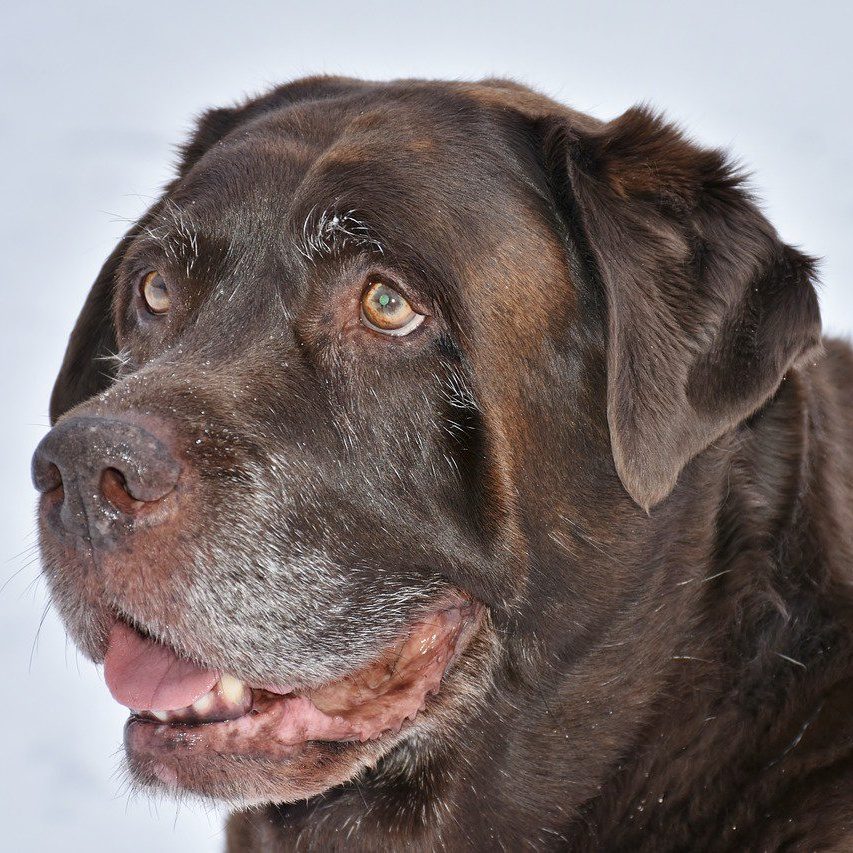
by Jess Franklin, DVM
How can I stop my old dog from pooping on the rug?
Elderly dogs that have been house trained for years may start to have stool accidents in the house for several reasons. Understanding why this happens may help you decrease the number and frequency of indoor accidents.
Your dog may have selected an area indoors because he needed to eliminate, and now is going back to this area. The original reason for going to the less-used area in the living room may have been because it was away from the common resting area for the dog, and now this area is considered a default area for elimination.
The best strategy for a healthy dog with normal bowel control who now poops in, for example, an unused area behind the dining room table is to gate it off, or close doors, and prevent access to the unacceptable indoor pooping area. If preventing access to the spot works, then part 2 of treatment is to have careful monitoring of the dog while they have short, supervised areas in the spot, being ready to correct if the dog postures to eliminate.
An older pet may have a fragile, brittle digestive tract. There may be very little warning that they need to go; when they feel the urge to eliminate, they need to go right now. For these pets, sometimes a dog door or a bell on the door, so they can go out quickly when they need to go, may help. Put up gates to keep the dog close to the outside door, and away from the carpet.
Diarrhea and soft stool
This is a medical problem and may be due to disease, parasites or an imbalance in colon organisms. When you come in for an exam for a pet with a soft stool or diarrhea, please bring a fresh fecal sample for testing.
We use fiber, specific antibiotics like metronidazole or tylan, and probiotics and bland food to manage diarrhea.
Senility
Loss of brain function with age happens to dogs as well as people. The senile dog may be confused, lost in the house, and may have less ability to communicate. He may even be unaware of the act of defecation. The senile old dog should be gated out of problem areas to protect the house.
Stool that is passed when a dog is sleeping or laying down, or falls out when he is walking, is a different issue. Often this is a dry, perfectly formed “Tootsie Roll” that is easy to pick up. It is dry because it has been in the colon a little longer than normal; it is coming out because new material is coming down and pushing it, which triggers reflex defecation. There can be a loss of connection between brain and colon, and there may be loss of nerves to the colon. This can happen in a dog that is otherwise not confused; some may also have increased panting noise, with partial paralysis of nerves to the larynx.
Things that may help this situation:
- Feed a low-residue, bland food to make total stool volume smaller, and avoid diet changes and treats that increase risk for soft stool or diarrhea.
- Go for regular, 3-times-per-day short leash walks, which will help empty the colon.
- Remember that this is not a punishable offense. Do not try to hurry the dog outside, or verbally correct any dog that has reflex defecation.
General Recommendations
Take regular short walks three times per day. Pick the same area, and keep it short. If your dog is strong and likes to go on an exercise walk, go to the elimination area first, then go on the longer walk.
Keep the diet bland to avoid soft stool. If you find a food that works, avoid changes.
Protect your house by setting up a low exercise pen or gates to keep the dog out of repeat problem areas.
Be aware that medications may cause soft stool. Sometimes carprofen or other nonsteroidal anti-inflammatory medications are very helpful to improve mobility, but worsen diarrhea.
Diapers for a female dog and a belly band for a male dog can be very helpful for control of urine, but do not seem to help for stool; stool stuck to back end of the dog can be harder to clean up than cleaning the floor.
Recent Posts
About Us
Ann Arbor Animal Hospital is a locally-owned animal hospital operating for over 90 years in Ann Arbor, MI.
